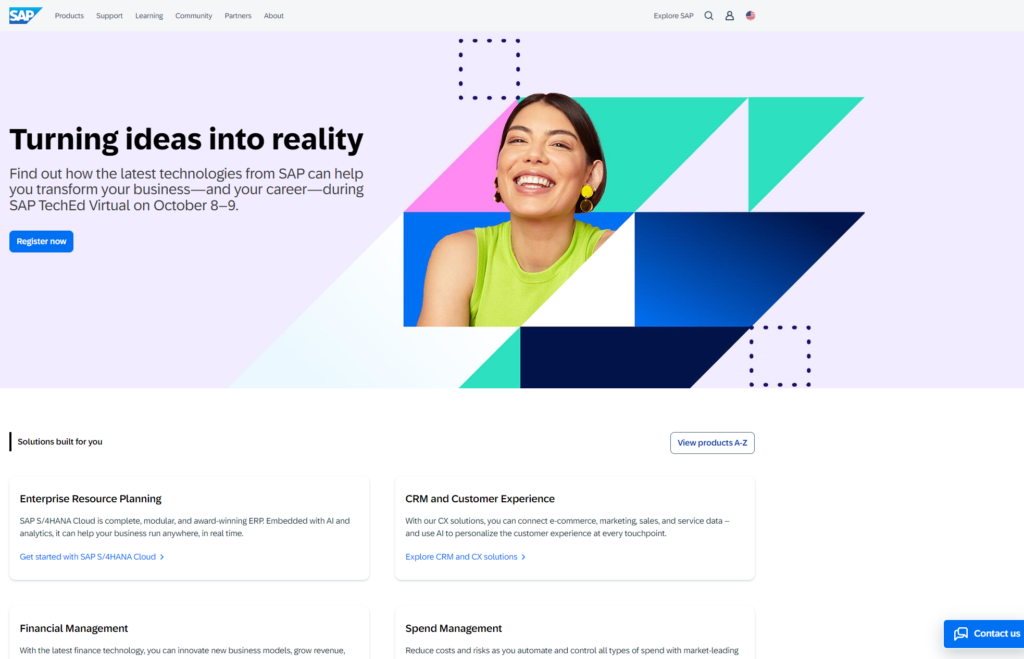SAP Business One is a leading enterprise resource planning (ERP) software designed specifically for small to mid-sized businesses. It offers integrated management solutions that cover key areas like finance, inventory, sales, and customer relationship management (CRM). Trusted by over 70,000 companies worldwide, SAP Business One provides businesses with the tools they need to streamline operations and drive growth.
This review will provide a comprehensive analysis of SAP Business One in 2024, highlighting its core features, latest updates, and overall benefits. We will assess the software’s suitability for small and medium businesses by evaluating its functionality, pricing, and how it compares to competitors. The review will also explore the improvements introduced in the 2024 edition, helping potential users understand if SAP Business One meets their business needs this year.
1. What is SAP Business One?
SAP Business One is an ERP software solution designed to help small and mid-sized businesses manage their core operations efficiently. The software integrates various business functions, such as financials, sales, inventory, and customer relations, into a unified system. SAP Business One is highly scalable, making it suitable for growing companies looking for robust tools to manage and optimize business processes. Its comprehensive reporting and analytics features enable companies to make data-driven decisions quickly.
Launched in 2002, SAP Business One was developed to provide small businesses with a simplified version of SAP’s more complex ERP solutions. Over the years, the software has seen continuous updates and improvements to meet modern business needs. In 2024, SAP Business One continues to evolve, offering enhanced functionality, cloud deployment options, and integrations with cutting-edge technologies like AI and IoT, ensuring that it remains relevant and competitive in today’s ERP market.
2. Key Features of SAP Business One (2024 Edition)
SAP Business One provides an array of features tailored to meet the needs of small and mid-sized businesses. The software covers crucial areas like inventory management, financial management, CRM, and business analytics. These features help companies streamline operations, manage resources effectively, and gain insights into business performance.
The 2024 edition of SAP Business One introduces several updates, including improved cloud integration options, enhanced mobile accessibility, and better AI-driven analytics. These enhancements are designed to improve user experience and provide greater flexibility for businesses looking to adapt to the digital landscape.
3. Benefits of Using SAP Business One for Small to Mid-Sized Businesses
SAP Business One is designed to address the core business needs of small and mid-sized enterprises, offering solutions that enhance integration, scalability, and flexibility. With its ability to centralize critical operations such as financial management, inventory, and customer relationship management, the software allows companies to operate more efficiently and respond quickly to market changes.
The platform’s flexibility enables businesses to grow without needing to switch systems, maintaining centralized management as business volume and operational complexity increase. Numerous case studies show how companies using SAP Business One have achieved significant improvements in operational efficiency and business growth.
For instance, businesses across various sectors have reported greater visibility into business processes, reduced operational costs, and increased overall profitability thanks to workflow automation and the ability to make data-driven decisions.
4. SAP Business One Pricing Structure
In 2024, SAP Business One will offer a flexible pricing structure to meet the needs of different small and medium-sized businesses. Licensing options include both traditional on-premise models and cloud-based subscription plans, allowing companies to choose between one-time payments or recurring fees.
Customization costs can vary depending on the complexity of the business requirements, with additional expenses for integrating extra modules or advanced functionalities. Compared to competitors like NetSuite and Microsoft Dynamics, SAP Business One is often seen as a more affordable solution for businesses seeking a robust yet accessible ERP.
Although costs may vary based on the number of users and required customizations, SAP Business One remains competitive in the market, especially for growing businesses that need a scalable ERP solution without a heavy upfront investment.
5. User Experience and Customer Feedback
The user interface of SAP Business One is designed to be intuitive and easy to navigate, offering accessibility and usability tailored to different business roles. The platform allows users to customize their dashboard and workflows based on their specific needs, making it simpler for employees in finance, sales, or inventory management to access the data they require efficiently. The system’s integration with mobile devices further enhances its usability, allowing users to manage operations on the go.
Common customer feedback in 2024 highlights the software’s strengths in streamlining operations and improving overall business visibility. Many users appreciate its flexibility and scalability, noting that it easily adapts to the growth and evolving needs of their businesses. However, some constructive criticism focuses on the learning curve for new users, especially when it comes to more advanced features and customization options https://www.g2.com/products/sap-business-one/reviews. Despite this, most customers agree that the software provides a comprehensive ERP solution that significantly enhances productivity once fully implemented.
6. SAP Business One vs. Competitors (2024)
When comparing SAP Business One with other ERP solutions like NetSuite and Microsoft Dynamics, several key differentiators stand out in 2024. SAP Business One is specifically tailored for small to mid-sized businesses, providing a more affordable and accessible solution compared to the larger enterprise-focused options like NetSuite, which can be more costly and complex for smaller operations.
A significant advantage of SAP Business One is its flexibility in deployment, offering both on-premise and cloud options, as well as integration with other SAP products, which can be crucial for businesses already using SAP ecosystems. Additionally, SAP Business One’s user-friendly interface and comprehensive modules for inventory, finance, and CRM make it an attractive choice for businesses seeking a straightforward ERP system.In comparison, while Microsoft Dynamics 365 is a strong competitor with more advanced AI-driven insights, it is often seen as more complex and better suited for larger enterprises. For businesses seeking a balance between functionality, cost, and scalability, SAP Business One remains a preferred choice, especially for companies aiming to grow without the need for frequent system upgrades.

